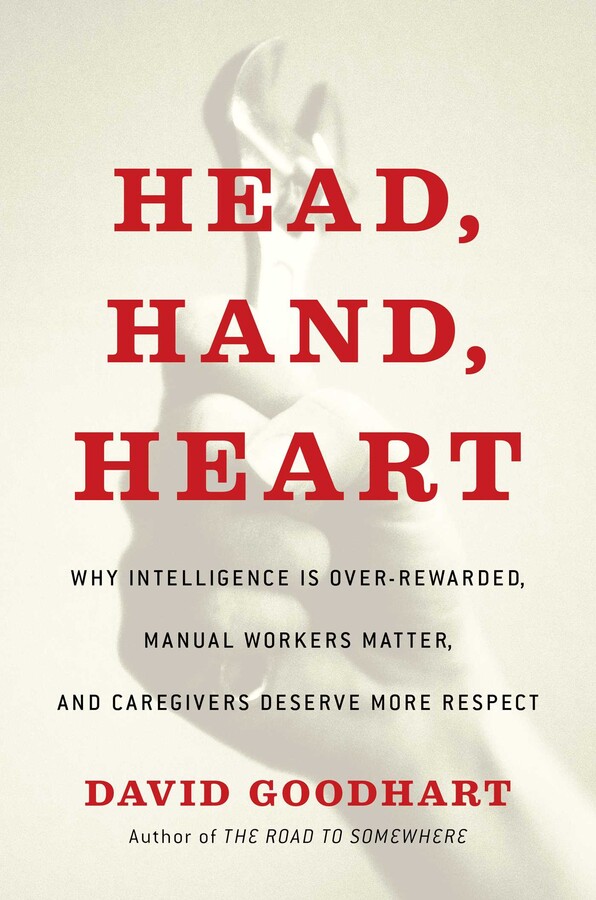Most of us want things to return to normal as swiftly as possible, but these coming years will also surely prove a hinge moment for politics in those rich countries in Europe and North America that have been overwhelmed by the crisis. There are several ways in which the crisis will enable, in the language of this book, Hand (manual work) and Heart (care work) to claim back some of the prestige and reward they have lost to Head (cognitive work) in recent decades.
At the most macro level a new version of globalization is now possible, summed up in one of the wittier slogans of the crisis: workers of the world unite, you have nothing to lose but your supply chains. Full- scale deglobalization is highly undesirable and is not going to happen; we have learned the lessons of 1930s protectionism. But some restraints on what economist Dani Rodrik has called “hyper-globalization”—the globalization that has favored large corporations, financial markets, and mobile skilled professionals — can be put in place.
The crisis has been the hour of the nation state and national social contracts at least in Europe, though in the United States it is the relative weakness of the central state that has been exposed. National democracies are likely to claim a greater say in the next phase of globalization. There will be some reshoring and shortening of those long, vulnerable supply chains. Lowest-cost globalization, which regrets the closure of the Midwest manufacturing plant but sees it as a price worth paying for cheaper goods in Walmart, will no longer win the argument so easily. Most of us are producers as well as consumers, and we might be prepared to pay a few dollars more for a smartphone produced closer to home.
Some of this sentiment was strengthening before the crisis. World trade fell slightly in 2019, partly as a result of the argument between the United States and China about what constitutes fair trade arrangements. The existing model of helter-skelter globalization has been producing too many losers, not least the global environment.
Western society has been dominated in the past two generations by centrifugal forces that have spread global openness and individual freedom but weakened collective bonds and enabled Head work to claim undue reward while Hand and Heart work has diminished in dignity and pay. The knowledge economy has placed cognitive meritocracy at the center of the status hierarchy, and the cognitively blessed have thrived — but many others feel they have lost place and meaning. Recent political trends, surely reinforced by the pandemic, suggest we are moving into a more centripetal phase, in which the nation-state will be consolidated and economic and cultural openness will be a little more constrained. This phase will place more stress on localism, social stability, and solidarity, it will be more skeptical of the claims of the Head and more sensitive to the humiliations built into modern, achievement societies.
As I was writing the book in 2019, I would not have dared to imagine the public appreciations of the Hand and Heart workers that became such a dominant image of the early weeks of the crisis. People were applauding not just those working in health services but also those who maintain the hidden wiring of our everyday lives—the supermarket shelf stackers, the bus drivers and delivery people, those who maintain the food and drug supply chains and remove household waste. Not all of them are manual workers in a literal sense but all of them do essential jobs. In a partial inversion of the status hierarchy, many of the truly key workers turned out to be people who did not go to college and were less adept at manipulating information.
The pause for reflection that the lockdown imposed on normally hectic, achievement-orientated societies and individuals may leave the deepest traces of all. Many of us, perhaps especially the privileged and highly educated, have been forced to reconsider what we value most deeply and, having looked up from our busy, mobile, existences, often met a neighbor for the first time and actually felt rooted in a physical community. And then, stepping out from our immediate neighborhoods, we have smiled and nodded at strangers even while politely giving them a wide berth.
This new sense of rootedness and connection, along with the heightened awareness of our mortality, can spill over into a mawkish sentimentality and a “safetyism” that eschews all risk and refuses all trade-offs. At the other end of the spectrum many people desperately want to enjoy their old freedoms, including the freedom to treat our fellow citizens with normal indifference. Some predict not so much a gentler, more caring society emerging from the crisis but a bout of wild hedonism and individualism—a new roaring twenties.
But the care economy has been at the center of the crisis, and that in itself is likely to prompt some reevaluation of mainstream economic and political thought. Just as old attitudes to large-scale government debt, and even printing money, have had to be revised even by conservative-minded politicians, so we may be pushed to reconsider our attitudes to productivity and even the very idea of the economic sphere. Rich Western societies already spend a large part of GDP on care, health, and welfare; this share is likely to increase another step in the wake of the crisis. And surely we need to more openly acknowledge that what we want in many parts of the care economy, from ICUs to elderly care homes, is lower productivity, not higher. We want fewer beds per nurse not more. This is true in large parts of the Heart economy, in health, and in education. And if we are to upwardly revalue the public care economy, and fund better the Cinderella parts such as elderly care, then what about the work done in the private care economy of the home looking after the young and the old? Should that not also be valued more too and not seen as a domain of oppression and limited opportunity?
That raises big questions about the gender division of labor and how to revalue domesticity without undoing the freedoms that women have achieved in recent decades. Our enforced confinement in the home caused much family tension, couple separation, and even violence. But it was also a reminder to many people of the primary value of family and the hard work of nurture and education that takes place within its walls. If Britain’s health service is, as the Conservative Prime Minister, Boris Johnson, declared, “powered by love” then how much more so the private realm of the family.
This is how I see the crisis as strengthening the Hand and Heart and readjusting the status balance somewhat with Head. To put it in political language, I see the crisis, particularly in Europe, as reinforcing an unusual coalition — a conservative preference for the local, the national, the family, along with a liberal preference for higher social spending and modest collectivism, combined too with a renewed concern for the environment. But that is what I thought before the virus struck too, as you can see from reading this book, so I have to plead guilty to Covid confirmation bias — the tendency to see your own assumptions about how the world should evolve confirmed by the crisis…. In the meantime, I think there are some grounds for optimism emerging from the crisis.
In our open, fractious societies, divisions and disagreements have noisily continued yet, below the surface, there has also been a greater sense of common destiny than usual. Arguments between liberals and conservatives, and left and right, will continue, as they should, yet I think there is a decent chance that one legacy of the crisis will be to acknowledge a wider range of human aptitudes in our allocation of reward and prestige— and thus a better balance between Head, Hand, and Heart. The bleak alternative is that the scars left by the epidemic will generate an even more divided and resentful politics.

Excerpted from HEAD, HAND, HEART: Why Intelligence Is Over-Rewarded, Manual Workers Matter, and Caregivers Deserve More Respect, by David Goodhart, Published 9/08/2020, Simon & Schuster / Free Press.


